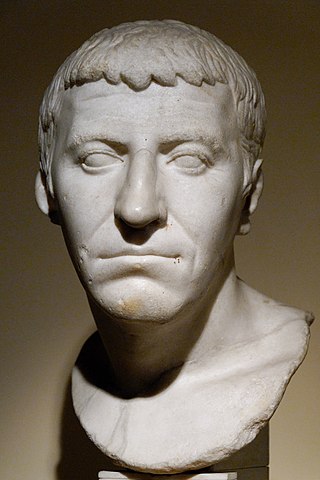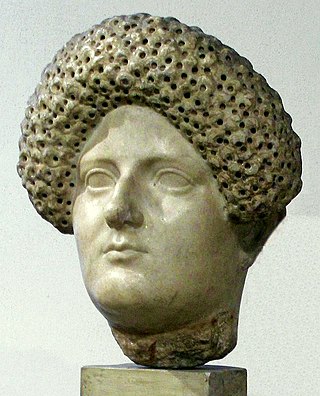Related Research Articles

Arria was a woman in ancient Rome. Her husband, Caecina Paetus, was ordered by the emperor Claudius to commit suicide for his part in a rebellion but was not capable of forcing himself to do so. Arria wrenched the dagger from him and stabbed herself, then returned it to her husband, telling him that it didn't hurt. Her story was recorded in the letters of Pliny the Younger, who obtained his information from Arria's granddaughter, Fannia.

Publius Clodius Thrasea Paetus, Roman senator, who lived in the 1st century AD. Notable for his principled opposition to the emperor Nero and his interest in Stoicism, he was the husband of Arria, who was the daughter of A. Caecina Paetus and the elder Arria, father-in-law of Helvidius Priscus, and a friend and relative by marriage of the poet Persius. Thrasea was the most prominent member of the political faction known today as the Stoic Opposition.

Gnaeus Domitius Corbulo was a popular Roman general, brother-in-law of the emperor Caligula and father-in-law of Domitian. The emperor Nero, highly fearful of Corbulo's reputation, ordered him to commit suicide, which the general carried out faithfully, exclaiming "Axios", meaning "I am worthy", and fell on his own sword.

Domitia Longina was a Roman empress and wife to the Roman emperor Domitian. She was the youngest daughter of the general and consul Gnaeus Domitius Corbulo. Domitia divorced her first husband, Lucius Aelius Lamia Plautius Aelianus in order to marry Domitian in AD 71. The marriage produced only one son, whose early death is believed to have been the cause of a temporary rift between Domitia and her husband in 83. She became the empress upon Domitian's accession in 81, and remained so until his assassination in 96. She is believed to have died sometime between AD 126 and 130.
Helvidius Priscus, Stoic philosopher and statesman, lived during the reigns of Nero, Galba, Otho, Vitellius and Vespasian.
When Vespasian sent for Helvidius Priscus and commanded him not to go into the senate, he replied, "It is in your power not to allow me to be a member of the senate, but so long as I am, I must go in." "Well, go in then," says the emperor, "but say nothing." "Do not ask my opinion, and I will be silent." "But I must ask your opinion." "And I must say what I think right." "But if you do, I shall put you to death." "When then did I tell you that I am immortal? You will do your part, and I will do mine: it is your part to kill; it is mine to die, but not in fear: yours to banish me; mine to depart without sorrow." Epictetus, Discourses, 1.2.19–21
Two noblemen, an uncle and nephew, who shared the name Lucius Junius Silanus Torquatus and were descendants of the Roman Emperor Augustus, lived during the 1st century AD.
Titus Avidius Quietus was a Roman senator active during the reigns of the emperors Domitian, Nerva and Trajan. The offices he held included suffect consul in AD 93 and governor of Roman Britain around 98.

Aulus Caecina Paetus was a Roman senator, who was condemned to death for his role in the revolt of Lucius Arruntius Camillus Scribonianus against the emperor Claudius. He was suffect consul in the nundinium of September to December 37 with Gaius Caninius Rebilus as his colleague.
Marcia Servilia or commonly known as Servilia was the daughter of Roman Senator Barea Soranus. Her father was part of the Stoic Opposition who opposed Nero's tyrannical rule. When he was sentenced to death by Nero in 65 or 66, Servilia was similarly accused and sentenced to death on a charge of consulting sorcerers supposedly to find out her father's fate.
Fannia was a woman of ancient Rome, notable as the granddaughter of Arria Major and daughter of Arria the Younger.
Quintus Junius Arulenus Rusticus was a Roman Senator and a friend and follower of Thrasea Paetus, and like him an ardent admirer of Stoic philosophy. Arulenus Rusticus attained a suffect consulship in the nundinium of September to December 92 with Gaius Julius Silanus as his colleague. He was one of a group of Stoics who opposed the perceived tyranny and autocratic tendencies of certain emperors, known today as the Stoic Opposition.

Publius Cornelius Tacitus, known simply as Tacitus, was a Roman historian and politician. Tacitus is widely regarded as one of the greatest Roman historians by modern scholars.
Titus Clodius Eprius Marcellus was a Roman senator, twice consul, best known for his prosecution of the Stoic senator Thrasea Paetus and his bitter quarrel with Helvidius Priscus. Eprius was also notorious for his ability to ingratiate himself with the reigning Emperors – especially Nero and Vespasian – and his hostility to any senatorial opposition, but in the last year of Vespasian, in circumstances that remain obscure, he was accused of treason and committed suicide.
Herennius Senecio was among the Stoic Opposition to the emperor Domitian, under whose rule he was executed. He was from Baetica in Roman Spain. He was the author of a laudatory biography of the Stoic martyr Helvidius Priscus.
Cossutianus Capito was a Roman senator and delator, often acting on behalf of the contemporary Roman emperor during the Principate. Tacitus offers a hostile portrait of Capito in his Annales, describing him as a "man stained with much wickedness", and as having "a heart eager for the worst wickedness".
Publius Rufus Anteius was a politician of ancient Rome of the 1st century CE.
The gens Helvidia was a plebeian family at Rome. Members of this gens are first mentioned in the final decades of the Republic. A century later, the Helvidii distinguished themselves by what has been called their "earnest, but fruitless, patriotism."

The Stoic Opposition is the name given to a group of Stoic philosophers who actively opposed the autocratic rule of certain emperors in the 1st-century, particularly Nero and Domitian. Most prominent among them was Thrasea Paetus, an influential Roman senator executed by Nero. They were held in high regard by the later Stoics Epictetus and Marcus Aurelius. Thrasea, Rubellius Plautus and Barea Soranus were reputedly students of the famous Stoic teacher Musonius Rufus and as all three were executed by Nero they became known collectively as the Stoic martyrs.
Junia Silana was a Roman patrician. She was the sister of Junia Claudilla, the first wife of Caligula, before he became emperor. Silana was a prominent figure in the power struggles that transpired in the reign of three different emperors. She was also noted for her close relationship with Julia Agrippina.
Atria Galla was a woman of ancient Rome related to various imperial intrigues by her husband, and reputed as "beautiful but low-born". She was first the wife of Domitius Silus but eventually left him for his friend Gaius Calpurnius Piso, whom she later became the second wife of. She may have been the mother of Piso's son, Calpurnius Piso Galerianus, though he also may have been adopted.
References
- ↑ Tacitus, Annals 16.34
- 1 2 Lightman, Benjamin; Lightman, Marjorie (2008). "Arria". A to Z of Ancient Greek and Roman Women. Facts on File. pp. 41–42. ISBN 9781438107943 . Retrieved 2023-05-02.
- ↑ Strunk, Tom (2017). History After Liberty: Tacitus on Tyrants, Sycophants, and Republicans. University of Michigan Press. p. 121. ISBN 9780472130207 . Retrieved 2023-05-02.
- ↑ Davis, Henry (2018). Creating Christianity - A Weapon Of Ancient Rome. Independent Publishing Network. ISBN 9781789265583 . Retrieved 2023-05-02.
![]() This article incorporates text from a publication now in the public domain : Smith, William (1870). "Arria (2)". In Smith, William (ed.). Dictionary of Greek and Roman Biography and Mythology . Vol. 1. p. 350.
This article incorporates text from a publication now in the public domain : Smith, William (1870). "Arria (2)". In Smith, William (ed.). Dictionary of Greek and Roman Biography and Mythology . Vol. 1. p. 350.